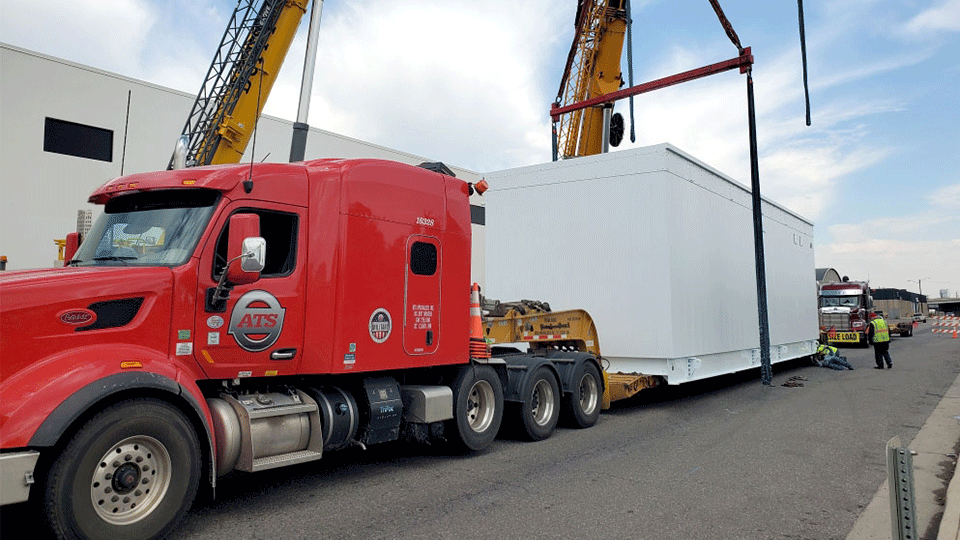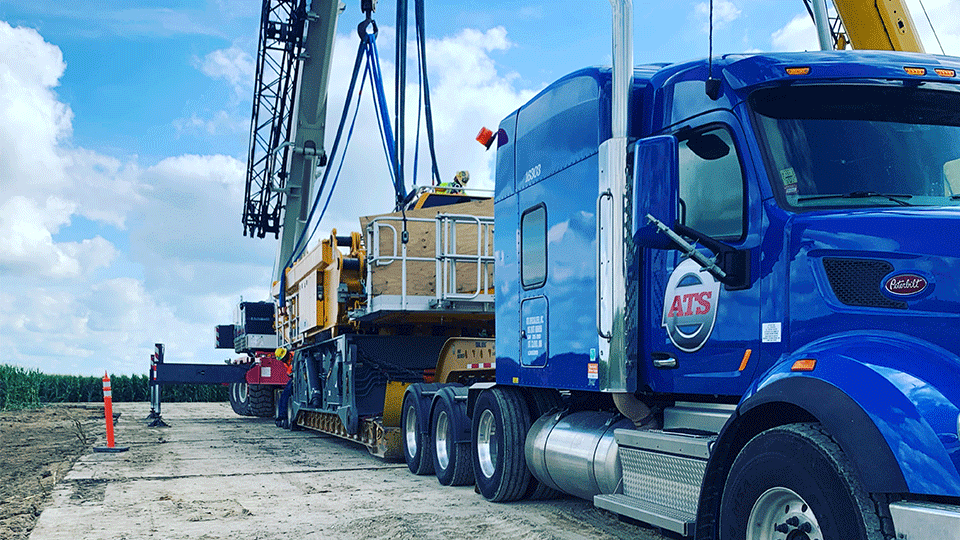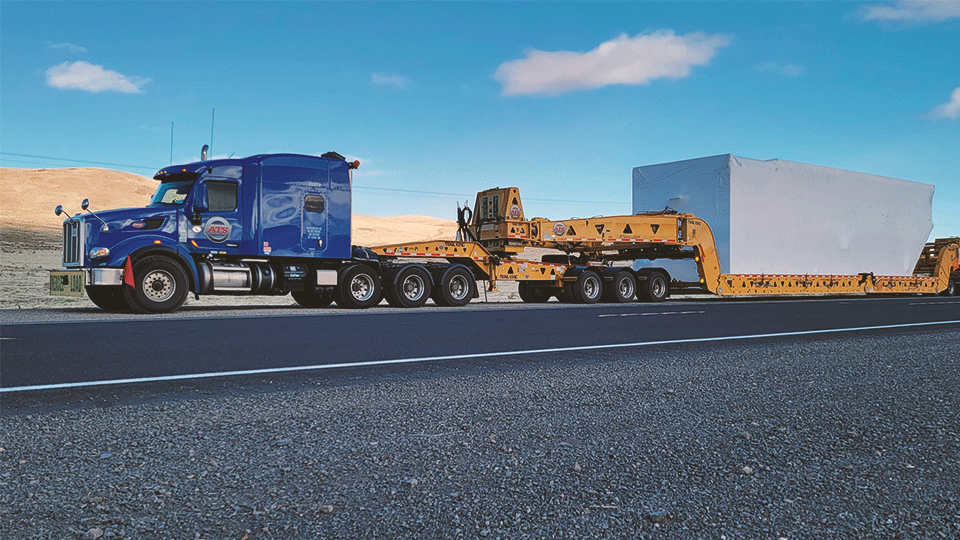
Heavy haul shipments are some of the most complex loads to move. Most will require permitting and route planning, a specialized trailer, a heavy haul truck, an experienced driver, and a thorough plan for safe loading, transport, and unloading.
Handing your heavy haul shipment to an inexperienced or unreliable trucking company could have serious consequences for your business. If your shipments fail, customers may question your ability to deliver as promised, timelines may extend, and your freight budget could balloon.
With so much at stake for your business — and so many stakeholders depending on the competence of your transportation provider — you can’t afford to make the wrong choice of heavy haul trucking company.
Here at Anderson Trucking Service (ATS), we’re proud to offer industry-leading heavy haul trucking services that meet the transportation needs of various industries.
While we’re confident that our experience, equipment, and quality service could help your business thrive, we also recognize that we're not the only company that offers these advantages. You deserve to trust your freight to a competent, reliable provider — even if ATS is not your carrier of choice.
The 10 carriers on this list have a proven record of delivering high-quality heavy haul services thanks to their expertise, fleet, and infrastructure. Use it as a starting place for your heavy haul provider search.
We've also included 4 tips for vetting any potential heavy haul provider, so you can be as prepared as possible to add new carriers to your network.
By the time you’re finished reading, you’ll have a better idea of which of the top heavy haul companies will be best suited to haul your freight. Let’s dive in!
Top 10 Heavy Haul Trucking Companies in 2025
First, a quick note on methodology. We determined which carriers to include on this list by looking at several factors, including history in the industry, heavy haul experience, fleet size, and reputation.
While this is by no means a comprehensive list of the best heavy haul trucking companies, we designed this year’s list to be a starting place for shippers looking to onboard a reliable provider that consistently ranks among the most successful and capable in the industry.
It’s important to note that we’ve factored ourselves out of this list. Why?
Our ultimate goal is to help you succeed, which means providing you with the straightforward, unbiased information you need to make the best decision for your company. If ATS isn’t the right fit for your needs, that’s okay — we’d feel confident referring you to our industry peers on this list. Each has a proven track record of success that makes them worth considering as you strive to improve your supply chain in 2025.
The following carriers are listed in alphabetical order:
- Bennett Motor Express
- Combined Transport
- Deep South Crane and Rigging
- HWH Transport
- Keen Transport
- Landstar Transportation Logistics
- Maxim Crane Works
- Mercer Transportation
- TFI International
- TMC Transportation
To help you make the most informed decision for your business, we’ve included some relevant high-level details about each of the providers on our list. Learn more about each heavy haul carrier below!
Fleet details and payload capacities are cited from the 2025 American Cranes & Transport Sourcebook unless otherwise noted. All other company details are sourced from that company's website unless otherwise noted.
Any additional sources will be denoted with an asterisk (*) and stated at the bottom of the company’s feature.
Bennett Motor Express
Year Founded: 1974
Headquarters: McDonough, Ga.
Fleet Size: 1,877 tractors, 1,466 specialized multi-axle trailers
Total Payload Capacity: 62,140 U.S. tons
Heavy Haul Solutions: Bennett’s oversized and heavy haul fleet has a range of trailers capable of hauling loads ranging between 37,000-200,000 lbs. Its super heavy haul services can handle loads weighing 1,000,000+ lbs. thanks to its own fleet of dual-lane and multi-axle equipment and partnerships with other heavy haul companies. Bennett’s heavy haul equipment includes:
- 3-axle stretch double-drop trailers
- 4-axle removable gooseneck trailers (RGNs)
- 4-axle step-deck trailers
- 9-13 axle configurations
- 19-axle trailers
- Custom trailer configurations up to 55 axles
- Double-neck Super 13-axle trailers
- Double-drop extendable trailers
- Drop deck extendable trailers
- Dual-lane dolly systems
- Spread-axle flatbed trailers
- Spread-axle step-deck trailers
Combined Transport
Year Founded: 1980
Headquarters: Central Point, Ore.
Fleet Size: 562 tractors, 281 specialized multi-axle trailers
Total Payload Capacity: 6,455
Heavy Haul Solutions: A self-described “deregulation baby,” the origins of Combined Transport date back to 1980 in Oregon. Now, the company offers heavy haul services for loads from 55,000-175,000 lbs. To offer these services, Combined has a variety of equipment at its disposal, including:
- 3-axle double-drop trailers
- A-frame flatbed trailers
- Drop-deck/step-deck trailers
- Flatbed trailers
- Lowbed/lowboy trailers
- Multi-axle trailers, incl. removable gooseneck (RGN) trailers
- Schnables
Deep South Crane and Rigging
Year Founded: 1968
Headquarters: Baton Rouge, La.
Fleet Size: 78 tractors, 502 specialized multi-axle trailers
Total Payload Capacity: 36,084 U.S. tons
Heavy Haul Solutions: Deep South has a 55-year history of solving heavy lift and transport challenges with innovative solutions. Its fleet includes self-propelled trailers, towed arrangements, and specialized multi-axle over-the-road combinations. Deep South’s heavy haul equipment includes:
- 3+-axle lowboys
- Double-drop trailers
- Drop-deck/step-deck trailers
- Dual-lane trailers
- Extendable double-drop trailers
- Extendable step-deck trailers
- Flatbed trailers
- Gooseneck trailers
- Lowboy trailers
- Schnable attachments
- Self-propelled trailers
Deep South also has high-capacity cranes, squat beams and stands, barge ramps, bolsters, marine securing services, hydraulic gantries, and ballasting capabilities, allowing the company to assist with moves over 1,000 tons.
HWH Transport
Year Founded: 2021
Headquarters: Tampa, Fla.
Fleet Size: 93 tractors, 423 specialized multi-axle trailers
Total Payload Capacity: 37,250 U.S. tons
Heavy Haul Solutions: The only regional carrier on our list, HWH Transport is a small-but-mighty provider operating in the Midwest and southeast regions of the country. HWH specializes in high, wide, and heavy freight transportation, including project cargo, heavy equipment transport, and machinery moves. HWH Transport’s equipment offerings include:
- Dual-lane transporters
- Flatbed trailers
- Hydraulic modular trailers
- Hydraulic platform trailers
- Lowboy trailers
- Multi-axle loaders
- Removable gooseneck (RGN) trailers
- Steerable dollies
- Step-deck trailers
Keen Transport
Year Founded: 1968
Headquarters: Carlisle, Pa.
Fleet Size: 400+ specialized multi-axle trailers, according to the company.
Total Payload Capacity: Not available
Heavy Haul Solutions: Keen Transport is a national provider of heavy haul transportation and logistics services for the construction, mining, and agricultural equipment markets. As part of the Wallenius Wilhelmsen Group, Keen is also able to provide ocean transport for heavy haul equipment. Keen’s fleet of heavy haul equipment includes:
- Drop-deck/step-deck trailers
- I-beam decks
- Lowboy trailers
- Multi-axle combinations (Up to 13 axles hauling loads up to 160,000 lbs.)
- Removable gooseneck (RGN) trailers
Landstar Transportation Logistics
Year Founded: 1968
Headquarters: Jacksonville, Fla.
Fleet Size: 9,180 tractors, 2,727 specialized multi-axle trailers
Total Payload Capacity: 92,265 U.S. tons
Heavy Haul Solutions: Landstar is one of the largest and most profitable over-dimensional and heavy haul platform carriers in the U.S., with an enormous fleet of tractors and specialized trailers. Landstar has a wide variety of heavy haul equipment, including:
- 40-80 ton capacity lowboy trailers
- Beam trailers
- Blade trailers
- Double-drop trailers
- Drop-deck/step-deck trailers
- Extendable trailers
- Flatbed trailers
- Multi-axle trailers
- Perimeter trailers
- Removable gooseneck (RGN) trailers
- Schnables
- Steerables
Maxim Crane Works
Year Founded: 2004
Headquarters: Bridgeville, Pa.
Fleet Size: 448 tractors, 1,836 specialized multi-axle trailers
Total Payload Capacity: 57,783 U.S. tons
Heavy Haul Solutions: Maxim is a coast-to-coast provider of heavy lift and heavy haul solutions. Its heavy haul division offers comprehensive heavy transportation services in addition to engineered services such as heavy lifting, rigging, engineering, and project management, making Maxim a “one-stop shop” for oversize/overweight (OSOW) movement needs. Maxim’s equipment offerings include:
- Dual-lane trailers
- Heavy-duty lowboy trailers
- Modular platform trailers
- Multi-axle trailers
- Perimeter trailers
- Self-propelled modular trailers (SPMTs)
- Spread-axle hydraulic expandable trailers
Mercer Transportation
Year Founded: 1977
Headquarters: Louisville, Ky.
Fleet Size: 2,200 owner-operated tractors, 1,900 open-deck trailers, according to the company.
Total Payload Capacity: Not available
Heavy Haul Solutions: Mercer Transportation’s OSOW services include heavy haul, heavy equipment hauling, military freight, construction machinery, and industrial freight. As heavy move specialists, Mercer also offers logistics and freight management services for heavy freight. Its equipment includes:
- Flatbed trailers
- Double drop lowboy trailers (with or without detachable deck)
- Drop-deck/step-deck trailers
- Flatbed trailers
- Removable gooseneck (RGN) trailers (with or without detachable deck)
TFI International (Daseke, Inc.)
Year Founded: 1957
Headquarters: Montreal, Quebec, Canada
Fleet Size*: 7,504 owner-operated tractors, 34,599 trailers
Total Payload Capacity: 87,469 U.S. tons (Daseke)
Heavy Haul Solutions: TFI International offers specialized flatbed and oversize/heavy haul services across North America. In 2024, TFI acquired Daseke, America’s largest specialized open-deck and heavy-haul carrier, for $1.1 billion. The acquisition added about 4,900 tractors and 11,000 flatbed and specialized trailers to TFI’s truckload division. It included Lone Star Transportation, Daseke’s largest heavy haul provider, with more than 1,500 trailers and 500 drivers.
*Fleet size for all TFI divisions according to Transport Topics. In 2024, Daseke reported a fleet size of 4,868 tractors and 3,787 specialized multi-axle trailers according to American Cranes & Transport.
TMC Transportation
Year Founded: 1972
Headquarters: Des Moines, Iowa
Fleet Size*: 3,492 company-owned tractors, 189 lease-to-own tractors, 4,429 trailers (All divisions)
Total Payload Capacity: Not available
Heavy Haul Solutions: TMC's specialized division provides solutions for challenging shipping needs in the 48 contiguous states, plus Mexico and Canada. Its variety of trailer types allows TMC to accommodate various types of construction machinery, agricultural machinery, and other commodities with additional loading and off-loading requirements.TMC’s equipment offerings include:
- 48-foot drop-deck/step-deck trailers
- 48-foot flatbed trailers
- 53-foot drop-deck/step-deck trailers
- 53-foot removable gooseneck (RGN) trailers
- Stretch multi-axle trailers
*According to Transport Topics
4 Tips For Choosing Your Heavy Haul Provider
The truth is, simply listing 10 heavy haul companies to consider in 2025 will only help you so much. Sure, now you know what these companies have to offer in terms of equipment quantity and variety, but so what?
Selecting the best trucking companies for your network is about more than picking the ones that have worked well for others. It’s important to make sure you’re matching your business’s unique needs to the capabilities of the heavy haul providers you choose.
So, let’s talk about the most important things to keep in mind when selecting a heavy haul transportation company. Beyond fleet size and capabilities, here’s what you should consider when vetting heavy haul carriers:
Core Strengths and Infrastructure
Even the best heavy haul carriers have a finite list of competencies. With so many different types of heavy haul cargo — from wind blades to generators and everything in between — no single company does everything well.
That’s why you’ll want to ensure the core strengths of your carrier match up with your primary needs.
Ask prospective carriers about their top-end capabilities and the types of commodities they move most frequently. Do they have heavy haul assets capable of hauling your shipment? Have they moved your type of cargo before?
These are crucial questions. If, for example, a heavy haul carrier can’t match your freight to the most appropriate solution or doesn’t have ample experience moving your type of freight, that’s probably not the best carrier for you.
A heavy haul carrier’s locational infrastructure is also important to consider. Does this carrier have trailer yards near your freight’s origin? This could be important for on-time performance and efficiency in the long term.
Perhaps more importantly: Do your top-choice heavy haul companies have in-house resources to oversee heavy haul moves from start to finish? These resources should include safety teams, permitting departments, driver training professionals, and project planners specializing in heavy haul moves.
The most experienced companies have a team of transportation professionals dedicated to each heavy haul load. Search for a carrier that offers a self-service customer portal and a single point of contact. These will help you communicate expectations to your customers and remain informed throughout each project.

Safety Practices
Heavy haul shipments are dangerous to haul due to their size and heft. If something goes awry during their transportation, it could put the driver and motoring public in danger.
Executing these loads safely takes a high degree of expertise and attention to detail at all stages of the process. Truck drivers must have the proper training and experience, just as operations employees and planners must have the right skill set and take the correct precautions.
Failing to plan correctly before heavy freight moves — by informing authorities, conducting surveys, contracting safety services, and clearing the route — can have major implications for all parties involved.
As such, safety should be your first priority when vetting a heavy haul carrier. Here are some questions that you’ll want to ask:
- Do you have a driver class and qualification system to ensure drivers are fit to haul heavy freight?
- What processes do you have in place to ensure the safe transport of my freight?
- What is the average age of your equipment?
- How often do you perform maintenance?
- What safety programs and teams does your company have in place?
If, for any reason, you feel uncomfortable about the way a carrier responds to these questions, move along. These shipments are too complex and dangerous to settle for anything less than the best.
Experience and Reliability
Experience is key to the success of any shipment; heavy haul moves just require more of it. Some of the intricacies accompanying heavy haul shipping can only be learned with time through trial, error, and continuous improvement.
From the top down, your next heavy haul carrier should have in-house experts at all levels. These experts should include drivers, customer service representatives, fleet managers, permitting professionals, and partner escort/pilot car service providers.
There’s another component of “experience” you should consider, too — your customer experience. Carriers that move heavy haul freight at the highest level don’t struggle to meet the commitments they make. Instead, great providers plan well, make timely adjustments where needed, and come through on their commitments.
This translates to a top-notch customer experience, one in which service is reliable, problems are addressed proactively, and shippers never feel out of the loop.
To get a better sense of a prospective heavy haul carrier’s experience and reliability, ask:
- How do you ensure on-time delivery?
- What is your on-time delivery rate?
- What is your protocol when something goes wrong?
- What kind of after-hours support do you offer?
- Do you have the ability to oversee my shipment in-house from start to finish?
Every carrier worth its salt will have well-prepared answers for these inquiries. The better you understand the level of competency each carrier can provide, the better suited you’ll be to make the right decision.
Another way to get reliable information is by asking carriers for a list of references to contact. Reach out to companies that move cargo similar to yours and ask for candid feedback on their experience with the carrier in question.
These companies don’t have any reason to mislead you, making them a great resource to utilize.

Pricing
Most heavy haul freight is moved on the spot market, where prices are calculated situationally. For this reason, it’s wise to request quotes from multiple carriers for each load.
Doing so allows you to compare rates and ensure you’re receiving a competitive one. Without weighing multiple quotes against each other, you could end up overpaying or underpaying for heavy haul service. Either instance could negatively impact your business.
Be wary of outliers when fielding heavy haul rates, and always ask carriers how they formulated your pricing. Here are some of the most important things to address during pricing conversations:
- What type of trailer are you quoting my freight on?
- What are my options and why?
- How much lead time will you need and why?
- How will this impact my rates?
- What does this quote include?
- Are escorts, permits, utility trucks, etc. included? If not, what is the upcharge for these services?
- How are cargo dimensions impacting my rate?
Drilling into a heavy haul company’s rates and having these honest conversations will increase your ability to make a sound selection decision.
Our best advice where vetting based on pricing is concerned? Steer clear of carriers that quote your load at a rate that’s too good to be true. At the end of the day, the price you’re quoted should be backed by confidence, expertise, and the ability to stick to them. Great heavy haul providers can easily articulate where your rates are coming from and why.
Related Content: What Does Heavy Haul Trucking Cost?
Select Better Heavy Haul Carriers in 2025
With this list of the top 10 heavy haul trucking companies in 2025 and the four key things to consider when vetting them, we hope you feel more comfortable continuing your search for your best-fit provider.
Leaving your freight in the hands of a shoddy heavy haul carrier can be damaging to your budget, reputation, and customer relationships. The more steps you take to avoid this in the selection stage of your journey, the better off you’ll be.
To help you avoid choosing a company that simply won’t fit your needs, we've developed our Heavy Haul Carrier Selection Checklist. It’s a free downloadable tool designed to help you thoroughly vet prospective additions to your heavy haul carrier network.
Use it to guide your conversations with carriers and ultimately find the right fit for your freight.




